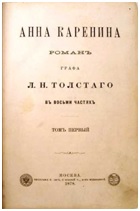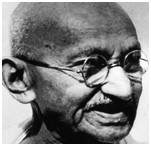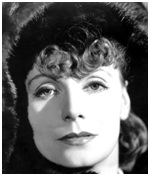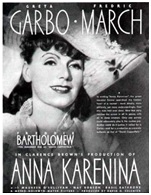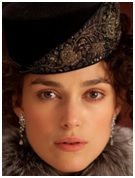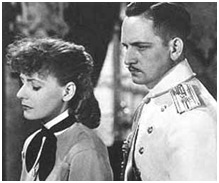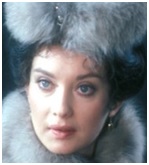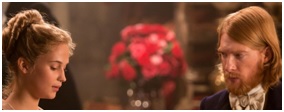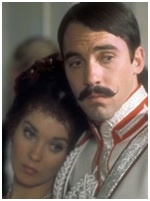|
 |
|
 |
Anna Karenina - Ethics and Love
Anna Karenina (1873-7)
Written by the Russian, Leo Tolstoy (1828-1910). Published as a serial (1873-7) and set in 1870’s Russia. War and Peace is Tolstoy's other famous book.
Fun facts
Key characters Anna (Karenina) , a beautiful aristocrat. (Alexei) Karenin , her husband. (Alexei) Vronsky , her handsome lover. (Konstantin) Levin , a landowner.
The story Dolly, a Russian aristocrat, has discovered her husband, Stiva’s adultery. But they are reconciled by his sister, Anna Karenina, the beautiful wife of the senior St Petersburg government official, Alexei Karenin. Dolly’s beautiful younger sister, Kitty, has two suitors: Konstantin Levin, a landowner, and Alexei Vronsky, a handsome soldier. Kitty chooses Vronsky, but, soon after, he falls in love with Anna (Greta Garbo, pictured right in the 1935 film). Kitty is heartbroken and Levin sadly returns to his estate. Vronsky follows Anna to St Petersburg and expresses his love for her, arousing the suspicion of Karenin. Karenin confronts her after she shows active interest in Vronsky at a horse race meeting, in which Vronsky
rides and falls. Karenin is stunned when Anna tells him they are in love and having a affair. Anna misses her son after moving in with Vronsky. Later she secretly visits him on his ninth birthday. Kitty and Levin fall in love and marry after meeting at a dinner party, and they have a baby daughter. After Karenin rejects her request for a divorce, Anna has Vronsky's child. But she nearly dies in childbirth, prompting Karenin to forgive her and Vronsky, who attempts suicide after feelings of guilt and humiliation. Anna and Vronsky live aimlessly and unhappily in Italy and return to Russia, where Anna’s adultery makes her a social outcast. She is jealous of Vronsky because, as a man, he is accepted back into society. She also feels that he is losing interest in her. Levin finds that marriage to Kitty restricts his freedom, but his love for her deepens after she
cares for his dying brother, Nikolai. She then discovers she is pregnant. Dolly visits Anna who is still awaiting a divorce and becoming increasingly paranoid that Vronsky no longer loves her. Meanwhile Kitty has a son, but Levin has mixed feelings about him. Karenin refuses to give a divorce to Anna who is increasingly angry towards Vronsky. After a quarrel accusing him of not loving her enough, she sends Vronsky a note of apology and, in a frenzy, goes to the train station to meet him. Desperate and confused, she throws herself under a train and dies. Kitty is worried about Levin’s depression resulting from a meaningless life. But he is transformed by a Christian conversion after a peasant tells him that life should be about being good and serving God. This spiritual transformation makes him feel, for the first time, real love for his son which delights Kitty.
Lessons for ethics and love
1. Purpose and peace are paramount Anna (Keira Knightley, pictured right, in the 2012 film) becomes unhappy because of:
Levin is much happier when his Christian conversion gives him a worthwhile purpose and peace of mind.
2. With freedom comes responsibilities Levin's relationship with his wife and son is deepened once he accepts his responsibilities towards them. Anna eventually blames all her problems on Vronsky instead of accepting responsibility to solve them herself. She loses her freedom by abandoning her responsibilities towards her son, daughter and husband. 3. True love is compassion not passion Anna’s philosophy is that love comes before everything, even duty. But she and Vronsky (pictured right together in the 1935 film) discover that passion doesn't last. Loving relationships also need:
Kitty tells Anna that she is her best friend because: “You've understood and understand me” . Anna:
4. Character matters more than charisma Anna and Vronsky are both beautiful and intelligent but plagued by character defects. Their relationship is destroyed by trying to find fault in each other, when they should have:
Vronsky can also be vain and insensitive as in his unwillingness to sacrifice his military career for Anna and
his jilting of Kitty. Anna (Nicola Pagett, pictured right, in the 1977 BBC adaptation) is:
5. Forgive Anna says that the ideal form of forgiveness is treating a sin “as if it hadn’t happened”. Forgiveness is difficult (Kitty hates Anna for stealing Vronsky from her), but it can win over the wrongdoer. Anna forgets about a divorce when her husband, Karenin forgives her. She is closest to Dolly who (unlike her other sister, Kitty):
Jesus’s principle of “turning the other cheek”, without vengeance, is often supported in the book.
6. Women are equal with men Despite losing her son and being rejected by St. Petersburg society, Anna is determined to:
7. Love and respect nature Levin (pictured right with Kitty in the 2012 film):
8. Heart before the head Levin realizes that his happiness and salvation come from the:
9. Happy families Successful families are either:
Anna and Vronsky (pictured in the 1977 BBC adaptation) had neither, so they became irritated with each other.
10. Business ethics Levin believes that business must be:
He attacks the acquisition of weath without work.
Key quote on family All happy families are alike; each unhappy family is unhappy in its own way, famous opening line.
Key quotes on love Where love ceases, there hate begins, Anna. Respect was invented to fill the place where love ought to be, Anna. When you love someone, you love the whole person, as they are, and not as you'd like them to be, Dolly (to Anna).
Key quote on peace of mind Each of us has his skeletons in his soul, Anna
Key quote on the past, present and future The terrible thing is that it is impossible to tear the past out by the roots, Anna
Two literature websites to recommend 1. sparknotes.com 2. litcharts.com |
|
|
||
|
|
|
||
|
||
| Copyright © wisdomtowin.com All Rights Reserved | ||
|

